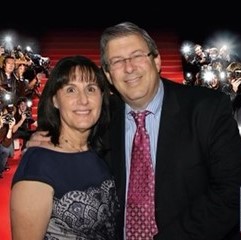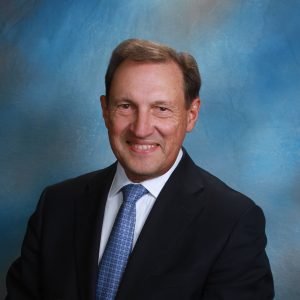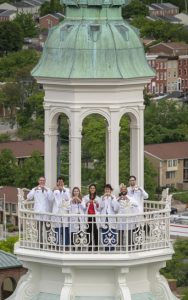Johns Hopkins UniversityEst. 1876
America’s First Research University
Scott Rifkin, MD, underwent his first heart surgery at just three years old. His second took place in high school. Last year alone, the physician, entrepreneur, and business owner says he underwent multiple procedures.

Rifkin, a 64-year-old internist, understands the lifelong challenges facing congenital heart patients — and the importance of finding a competent, compassionate care provider. He’s got that in Stacy Fisher, MD, his cardiologist and the associate director of the Johns Hopkins Adult Congenital Heart Disease Center.
“Dr. Fisher is as knowledgeable a physician as you’re ever going to meet,” Rifkin says. “Add to that a tremendous ability to connect with her patients. She’ll call you every single day if you’re having an issue.”
Rifkin says it’s a “great privilege” to support the work of Fisher and her colleagues at the center. Last year he and his wife Frances made a five-year, $800,000 pledge to launch the new advanced fellowship program in adult congenital heart disease (ACHD).
Guillermo Torres-Viera, MD, the program’s first fellow, is a pediatric cardiologist who will now train in adult care. Soon, he’ll be able to follow patients like Rifkin from childhood all the way to adulthood.
Despite the lasting complications that patients with ACHD face, cardiologists are typically trained to treat either children or adults, not both. “Very few people in the world have the extended training and can continue the care past childhood,” Fisher explains.
She says the Rifkins’ donation will provide much-needed opportunities to doctors like Torres-Viera, as well as patients navigating ACHD through various states of life. “There isn’t another fellowship like this one in this region. There is no funding for these programs,” she explains. “What the Rifkins have allowed us to do is extend care to many more patients and build a future of care that didn’t exist before. This type of training is critical.”
Now that Torres-Viera is at Hopkins, he’s eager to apply his experience in pediatric cardiology to adult patients. “It’s always been a dream to help and guide patients on the life journey that is ACHD,” the cardiologist says. “Now, I can impact their health care going forward.”

Meanwhile, in the Division of Cardiology’s general fellowship program, an endowed fund established by Paul Dlabal, Med ’75 (MD), chief of cardiology at the Veterans Affairs Medical Center in Martinsburg, West Virginia, facilitated a competitive award to support fellows as they pursue new research.
Dlabal, who made his original gift as a $25,000 pledge on the 25th anniversary of his graduation from the School of Medicine, continues to add to the fund with annual gifts. He said the competition component of the fellowship was inspired by his years as an aspiring concert pianist.
“What I learned from that experience, other than that there are many, many more people more talented than I am, is that the growth and development of a performer depends to a great extent on public competition,” he says. “So I thought, let’s take the very best fellows — and it’s already the best of the best at Hopkins — and let them compete for the best research project.”
Second-year cardiology fellows compete for the Dlabal Clinical Research Award, as determined by faculty vote, which is then used during their research years, an especially critical time for building the academic portfolio of the fellows.

“This is usually the year before they join faculty or pursue more advanced training,” says Thorsten Leucker, MD, PhD, director of the Cardiology Fellowship Program. “And it’s fundamentally important to develop the research that will help them be successful in applying for funding down the road, as academic cardiologists.”
Unlike lots of other funding sources, funds from the Dlabal Foundation can be used “to support something completely new,” Leucker says. “These can be novel and innovative ideas, areas that might not even have preliminary data.”
For instance, this year’s Dlabal fellow, Nestor Vasquez, MD, is building a clinical program to investigate a percutaneous procedure that blocks the stellate ganglion to suppress ventricular arrhythmias.
Dlabal says encouraging creativity is important to him, as is allowing the fellows to manage their own funds. “This gives them a feel for how to manage assets, potentially reaching a new understanding of the pitfalls and difficulties in research,” Dlabal says. “The fellows have told me that the resource management part of the process has been eye-opening.”
As federal grants become harder to achieve, philanthropic gifts like Dlabal’s are an important “pillar of financial support,” Leucker says, adding that he also benefitted from donor support of the cardiology fellowship program. “It accelerated my career and really paved the way to come on faculty with a running start.”
Dlabal also knows how impactful training at Johns Hopkins can be. “It’s life-changing,” he says. “Not only did I receive the fundamentals of medical education, but a recognition of the history of medicine and how things got the way they are. We learned to see our role as part of a continuum.”
Donors like Dlabal and the Rifkins are as vital a part of that continuum as the up-and-coming doctors they support. “The fellows are our future,” Leucker says.
Topics: Alumni, Faculty and Staff, Friends of Johns Hopkins Medicine, Heart and Vascular Institute, Johns Hopkins Medicine, Fuel Discovery, Support Scholars